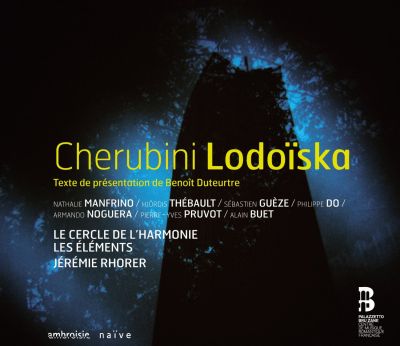CHERUBINI Lodoïska
Rhorer and his forces tape a possible model for Fidelio
View record and artist detailsRecord and Artist Details
Genre:
Opera
Label: Naïve
Magazine Review Date: 09/2013
Media Format: CD or Download
Media Runtime: 109
Mastering:
DDD
Catalogue Number: AM209

Tracks:
| Composition | Artist Credit |
|---|---|
| Lodoïska |
Luigi (Carlo Zanobi Salvadore Maria) Cherubini, Composer
(Le) Cercle de l'Harmonie (Les) Eléments Alain Buet, Altamoras, Bass-baritone Armando Noguera, Varbel, Baritone Hjördis Thébault, Lysinka, Soprano Jérémie Rhorer, Conductor Nathalie Manfrino, Lodoïska, Soprano Philippe Do, Titzikan, Tenor Pierre-Yves Pruvot, Dourlinski, Baritone Sébastien Guèze, Floreski, Tenor |
Author: Richard Lawrence
Cherubini’s score is full of good things. There’s a polonaise in which the vocal lines for Varbel and Floreski, first heard in succession, are combined for the third stanza. The action moves forward in symphonically developed ensembles and ‘chain’ finales: Berlioz must surely have had in mind the quickfire exchange of phrases between heroine, master and servant in Act 1 when he came to write the comic trio in Benvenuto Cellini. The harmony is adventurous and the orchestration a delight. Lodoïska’s ‘Hélas! Dans ce cruel asile’ is accompanied by flutes, horns and muted strings without double basses. Elsewhere, the clarinet-writing is handled with a confidence that Haydn might have envied.
The cast, made up almost entirely of native French speakers, is pretty good. Floreski and Titzikan are both tenors but the former part is written in the alto clef, signifying an haute-contre. Sébastien Guèze has the right kind of lightness, just managing to avoid crooning in the canonic section of the Act 2 finale. Philippe Do, appropriately heroic, in turn just gets away with his top C at the end of ‘Triomphons avec noblesse’. Nathalie Manfrino is splendidly passionate in Lodoïska’s second air, where Cherubini’s vigorous music belies the pleading of the words. The Varbel and Dourlinski are fine but yield in characterisation to Alessandro Corbelli and William Shimell for Muti: a set I commend also for its fuller spoken dialogue and greater provision of separate tracks. Jérémie Rhorer and his period-instrument band are exemplary.
Discover the world's largest classical music catalogue with Presto Music.

Gramophone Digital Club
- Digital Edition
- Digital Archive
- Reviews Database
- Full website access
From £8.75 / month
Subscribe
Gramophone Full Club
- Print Edition
- Digital Edition
- Digital Archive
- Reviews Database
- Full website access
From £11.00 / month
Subscribe
If you are a library, university or other organisation that would be interested in an institutional subscription to Gramophone please click here for further information.




